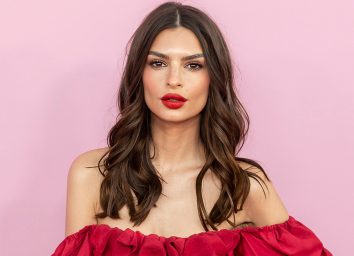6 Ways Elizabeth Hurley Loses Weight at 58
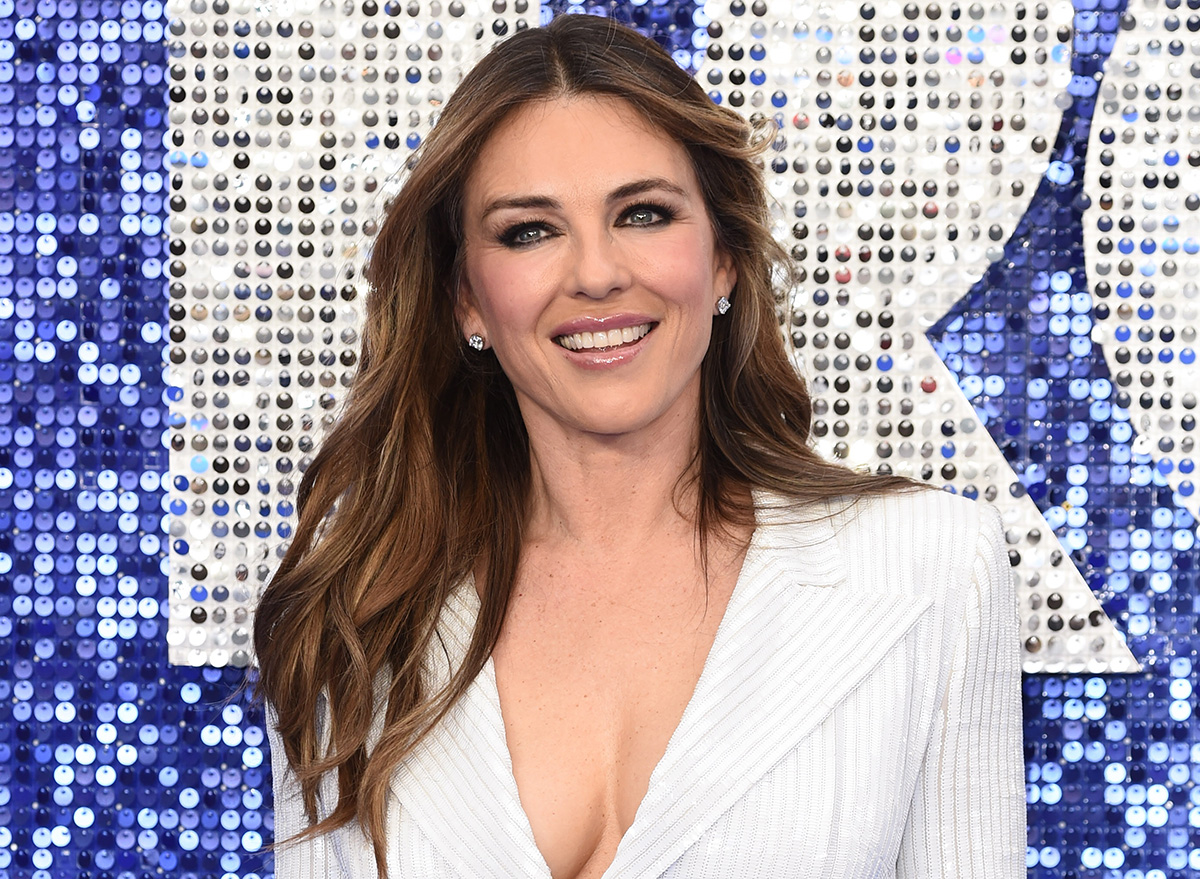
Elizabeth Hurley practically lives in a bikini–or it seems that way from her Instagram, which is understandable when you own a bathing suit line and you look like a goddess. The 58-year-old isn't shy about posting pics in barely there swimwear and flaunting her toned physique. The age-defying celebrity works hard at staying in shape and follows a strict diet that is definitely working for her. Hurley revealed her healthy lifestyle choices in an interview with The Sunday Times in 2021 and we take a closer look at what she eats and ask nutrition experts what they think.
She Doesn't Eat Ultra-Processed Food
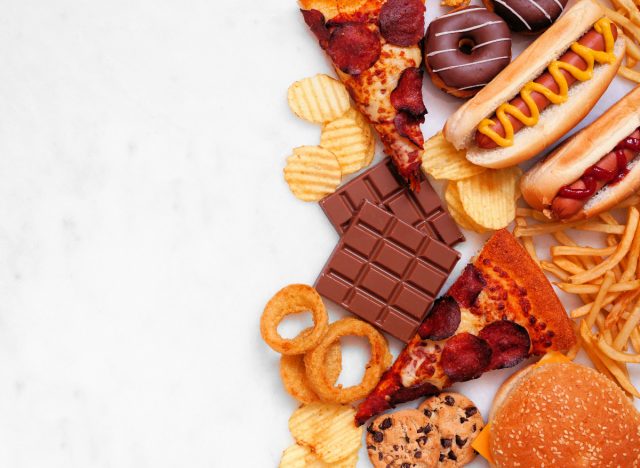
We all know that ultra-processed foods are made from fats, starches, added sugars, and hydrogenated fats and should be avoided. However, it's hard to pass up your favorite bag of chips all the time. Hurley is not one to be tempted. "I haven't eaten processed food for 100 years," she said.
What the Expert Says: "Foods modified from their natural state are known as processed foods," Cheryl Mussatto, MS, RD, LD, Outpatient Clinical Dietitian at Cotton O'Neil Endocrinology and Diabetes Clinic, explains. "This can involve adding unhealthy ingredients such as excess sugar, salt, or fat, removing nutrients, or altering texture and taste. Consuming a diet predominantly composed of ultra-processed foods can lead to weight gain due to a combination of factors, including providing too many calories, usually in the form of sugar and fat. These foods often lack fiber, which is important for helping us stay fuller longer." She adds, "These same foods can also lead to overconsumption as they often are absorbed quickly, and then you get hungry again within just a few hours. They basically have little 'staying power' to provide longer-lasting satiety."
She Avoids Sugar
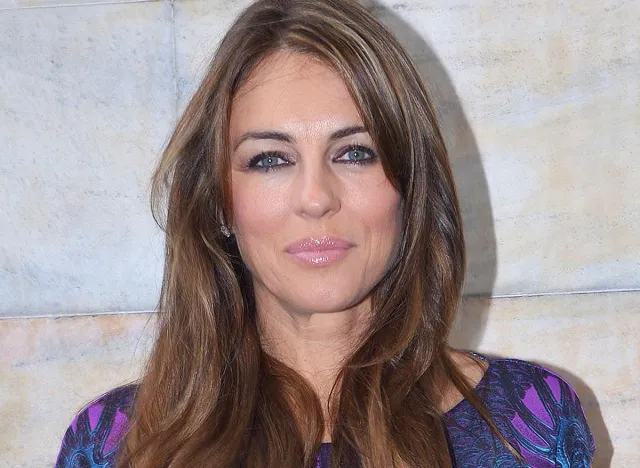
Another thing the British actress doesn't touch is sugar. "I don't eat sweets," she shared. It's easy to consume more sugar than you realize, so reading ingredient labels is important. "Problems occur when you consume too much-added sugar — that is, sugar that food manufacturers add to products to increase flavor or extend shelf life," Harvard T.H. Chan School of Public Health reports. "In the American diet, the top sources are soft drinks, fruit drinks, flavored yogurts, cereals, cookies, cakes, candy, and most processed foods. But added sugar is also present in items that you may not think of as sweetened, like soups, bread, cured meats, and ketchup." The site finds, "The result: we consume way too much-added sugar. Adult men take in an average of 24 teaspoons of added sugar per day, according to the National Cancer Institute. That's equal to 384 calories."
What the Expert Says: According to Mussatto, "The impact of added sugars on body weight is likely due to excess calorie intake, although the low satiety of simple carbohydrates may also be a factor. Replacing foods and beverages high in added sugars with those with little or no added sugars, such as fruit, whole grain breakfast cereals, Greek yogurt, and noncaloric beverages, can save hundreds of calories without affecting the amount of food you consume."
She Balances What She Eats with Vegetables
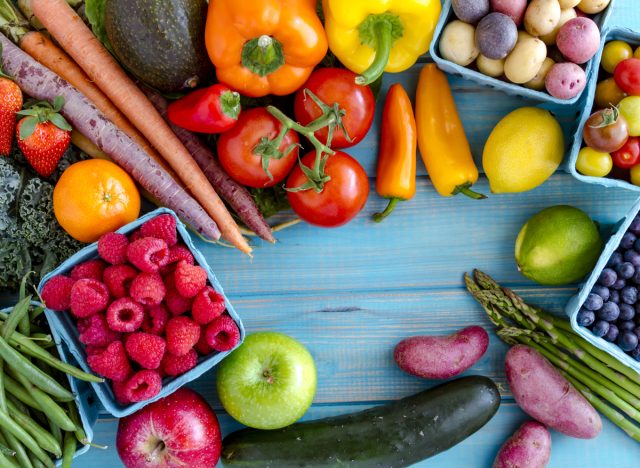
Hurley is very mindful about what she consumes and loads up on fruit and vegetables. "I think one of the most transformative things that I've done is making 50 percent of what I eat vegetable matter," she explained. "If you have a slice of toast for breakfast, have an apple too. Counteract everything with vegetables."
What the Expert Says: Nutritionist Rania Batayneh, MPH, author of the bestselling book The One One One Diet, tells us, "Vegetables play a crucial role in promoting health and fitness due to their rich nutrient content and various beneficial properties. Here's how vegetables can contribute to your overall health and fitness:
- Nutrient Density: Vegetables are packed with essential vitamins, minerals, and antioxidants that support overall well-being. These nutrients are important for immune function, energy production, and various bodily processes.
- Low in Calories and High in Fiber: Most vegetables are low in calories and high in dietary fiber, which can help you feel full and satisfied while managing your weight. Fiber also supports digestive health and helps regulate blood sugar levels.
- Hydration: Many vegetables have a high water content, contributing to hydration and helping maintain optimal bodily functions.
- Heart Health: Leafy greens and other vegetables are rich in potassium, which can help regulate blood pressure and support heart health. The fiber and antioxidants in vegetables also contribute to heart health by reducing inflammation and promoting healthy cholesterol levels."
She Eats Peanut Butter
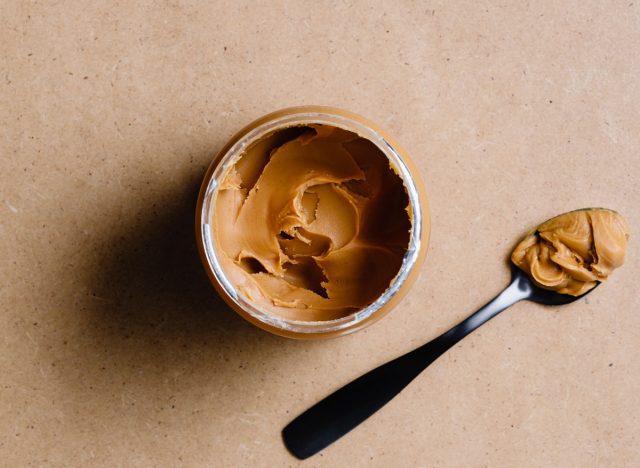
The mother of one doesn't treat herself to desserts, but when she does indulge, peanut butter is her go-to. "I have one spoon, then another, and I've emptied the jar before you know it."
What the Expert Says: "Peanut butter, when consumed in moderation (each tbsp. contains 95 calories and 8 grams of fat) and as part of a balanced diet, can offer several health benefits due to its nutrient content," Batayneh says. "I encourage clients to stick with 1 tbsp. of peanut butter per day, despite the serving size of 2 tbsp. that is indicated on most store-bought brands. She adds, "I recommend pairing peanut butter with a protein, like Greek yogurt, and for your carbohydrate, you can choose fruit to add more nutrients and a boost of antioxidants. It's this 1:1:1 combination of macronutrients that will keep your blood sugar stable." Here are some potential health benefits of peanut butter, according to Batayneh.
- Rich Source of Plant-Based Protein: Peanut butter is a good source of plant-based protein, which is essential for tissue repair, muscle growth, and overall body function.
- Healthy Fats: Peanut butter contains monounsaturated and polyunsaturated fats, which are considered heart-healthy fats. These fats can help improve cholesterol levels and support cardiovascular health.
- Nutrient Dense: Peanut butter is rich in various vitamins and minerals, including vitamin E, magnesium, potassium, and phosphorus. These nutrients play important roles in maintaining various bodily functions.
She Cuts Back on Alcohol

Hurley might attend the most extravagant parties and events, but you won't catch her drinking very often. "I drink little alcohol," she revealed.
What the Expert Says: "Alcohol contains nearly the same number of calories per gram as fat – 7 calories per gram is found in alcohol, while fat provides 9 calories per gram. If weight loss is your goal, reducing your alcohol intake can be helpful," Mussatto emphasizes. "Drinking alcohol can also make you feel hungry, leading to cravings for salty and greasy foods. It's also worth mentioning that late-night snacking after drinking or indulging in junk food while hungover can contribute to weight gain."
She Spends Time Outdoors
One full of healthy foods, Hurley spends much of her time outdoors. "The most relaxed I can ever be is if I go out into my yard and do some gardening," she told E! News. "When I'm working in the yard, I'm stretching, I'm bending and I find that's good for both my mind and body." She added: "I don't like so much to go to the gym, but I like to go for really long walks," she continued, "It's almost always about going outside."


